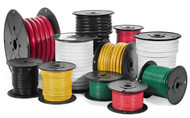If you’ve ever had battery trouble on a trip, whether on land or out on the water, you surely know how much of a damper it can put on productivity and enjoyment. Unfortunately, all physical systems wear out with use, which is why watching for signs that indicate a need for extra maintenance is such an important action to take. In this article, we will explore how you can watch for the signs that could indicate marine battery cable failure so that you can catch it before it becomes a problem.

Sign #1: Residue or Buildup Around Battery Contacts
Upon inspecting your battery, carefully look at the contacts of your battery, where the marine battery cable connects to your battery. A sign that you might need to replace your battery cable or even the battery itself is the accumulation of mineral residue around the contacts. Be careful with this residue, as it can be corrosive to the touch.
Sign #2: Crackling Cables
Believe it or not, it is possible for cables to degrade beneath the insulation in such a way that you might not be able to immediately see the degradation. Of course, sometimes you might be able to identify damage to a cable by looking for damage to the exterior insulation, but in cases that the copper on the inside degrades or is damaged, you’ll have to turn to a different technique than visual inspection.
To inspect a cable for internal damage, gently bend the cable while listening closely for crackling or snapping noises. Crackling or snapping can indicate broken or displaced copper on the inside of the cable. A marine battery cable that crackles when gently bent should be replaced.
Sign #3: Scent of Burning Rubber or Acrid Scent
If you notice an odd scent in your boat’s battery compartment, pay close attention. A scent of burning rubber or an acrid/acidic scent can indicate a cable that is overheating and damaging its insulation from the inside out. Such a scent could also indicate battery leakage, which is an even more serious problem than marine battery cable damage. Regardless, strong smells in your battery compartment should not be ignored and might be a good prompt for more formal maintenance.
Sign #4: Hot Cables
The last sign that could indicate a need to replace cables is a cable that is physically hot to the touch through its insulation. While some residual engine heat may warm up cables somewhat, cables should not become hot from regular use, as their insulation is designed specifically to prevent overheating. Hot cables could indicate a flawed cable or an issue with the current running through your electrical system.
Do you need to replace your cables? Are you unsure whether you need new cables? Our team of professionals can help you further. We stock certified, high-quality cables at fantastic prices. Come visit us today at www.ewcswire.com and see how we can help you ensure your boat is ship-shape.
Comments
Post a Comment